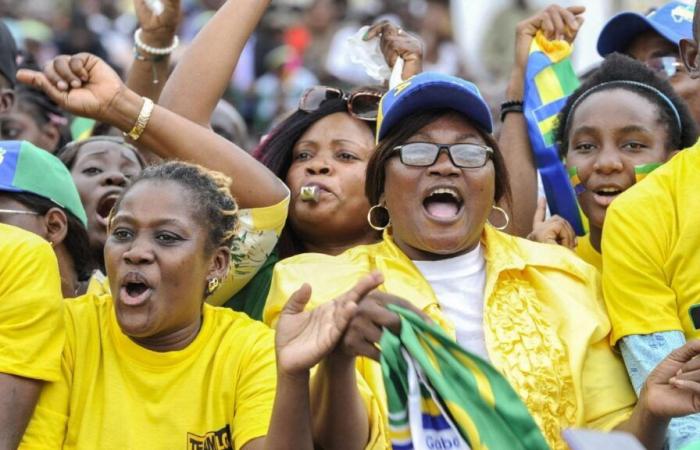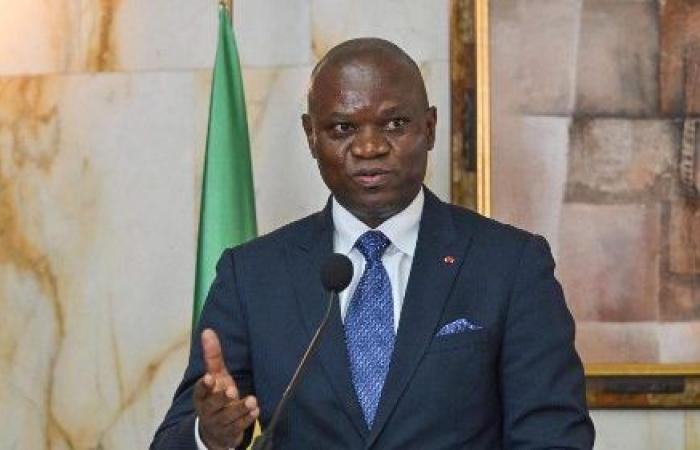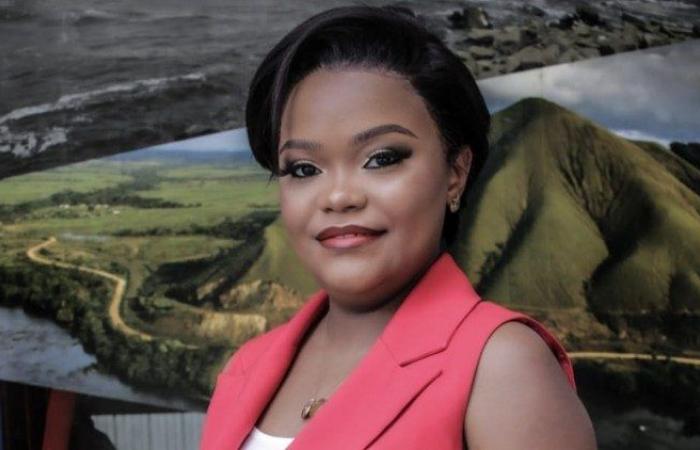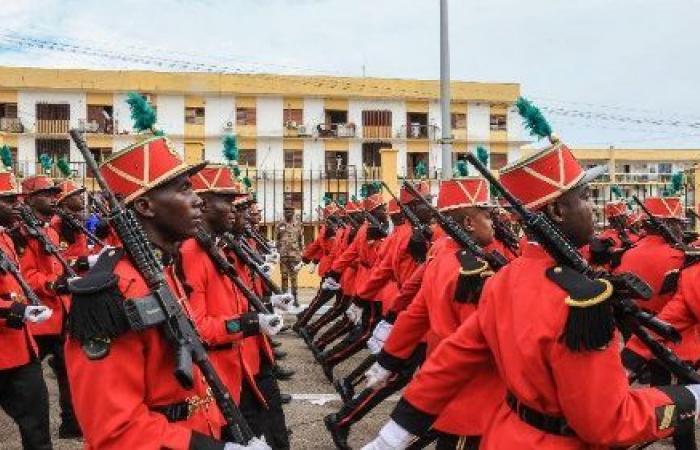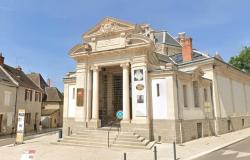After a eight-day campaign, around 860,000 Gabonese voters are called to vote on Saturday, November 16 to say “yes” or “no” to the new Constitution drafted by the transitional government. According to political analyst Lysiane Neyer, this referendum is a test for the authorities resulting from the coup, who have promised to restore institutions and return power to civilians. She calls on her compatriots to vote massively to rebuild a new Gabon.
Stanislas Kambashi, SJ – Vatican City
This draft Constitution is drawn up by the transitional authorities of the coup d'état of August 30, 2023. This referendum is a historic moment to rebuild a new Gabon, based on ethical values, believes Gabonese political analyst Lysiane Neyer, also national media secretary and spokesperson for the “For Change” (PLC) party. In an interview with Radio Vatican–Vatican News, she calls on all Gabonese registered on the electoral lists to fulfill this patriotic duty, because the victory will not be that of one side, but of democracy. She also believes that this vote is a historic moment to rebuild a new Gabon, based on ethical values. Interview.
What issues does this referendum present for Gabon at the moment?
This referendum is a first test for the authorities leading the transition in Gabon. They staged the coup on August 30, 2023 with the promise of restoring institutions. And this restoration involves the review of certain texts which constitute the legal corpus of Gabon, and they have proposed a constitution which is subject to the direct vote of the populations. So the main issue of this referendum is to know whether this draft constitution receives the assent of the majority of Gabonese people or, on the contrary, we must take the time to work further to amend it. or refine it further. This constitution, which is the mother of laws, the backbone which will govern the functioning of the State, is a fundamental text for any democratic nation. So the challenge is to collect the maximum number of votes, whether for yes or no, to subsequently avoid blockages that could arise if the scores were very, very close between the two camps.
You have just highlighted the importance of these votes. Do you think yes has a chance of winning over no?
I would not pretend to make estimates, I am not a polling institute. I think that each side has presented valid arguments and that each citizen will have to make the effort to decide, in any case, on yes or no, knowing that in all cases it is the Gabonese democracy which will emerge strengthened.
Do you think that the Gabonese people are sufficiently prepared and will vote knowing what is said in the text, with knowledge of the causes??
It is true that the time between the publication of the text and the holding of the referendum was quite short, but I think that the yes and no teams were sufficiently deployed on the ground, that this constitution sufficiently animated the debates, that They are official or unofficial. So I think that Gabonese citizens will be able to decide objectively on yes or no, particularly with regard to the main articles of this constitution.
The new fundamental law is the fruit of contributions collected during the national dialogue which ends in April and establishes, among other things, a 7-year mandate renewable only once with a presidential regime endowed with strong power, without a prime minister and the impossibility of a dynastic transmission of power. Do you believe that this is likely to help Gabon for its future?
This constitution can lead us to have a better tomorrow. Already, in that it establishes term limits for the first time, it is a first in Gabon. The 7-year mandate in itself does not pose a problem because we are a developing country. The infrastructure projects are enormous and we must give the head of the executive time to set the milestones and projects that matter. We have observed that in Africa, most of the countries which have 5-year mandates find themselves wanting to add a third mandate precisely because this duration of 10 years for countries where everything is still to be done seems quite short to me. So, this 7-year mandate, I think it is well calibrated and with the limitation of two mandates, I think it guarantees that the head of the executive gives the best of himself knowing that he is limited in time and that he has a duty to succeed in his action.
The opposition, notably the “Together for the Gabons” platform of Mr. Alain-Claude Bilié-By-Nze, last head of government under Ali Bongo, calls for saying “No to the legalization of the coup d'état in the constitution, no to a seven-year mandate and not to a president king of Gabon. Do you think this voice can be heard?

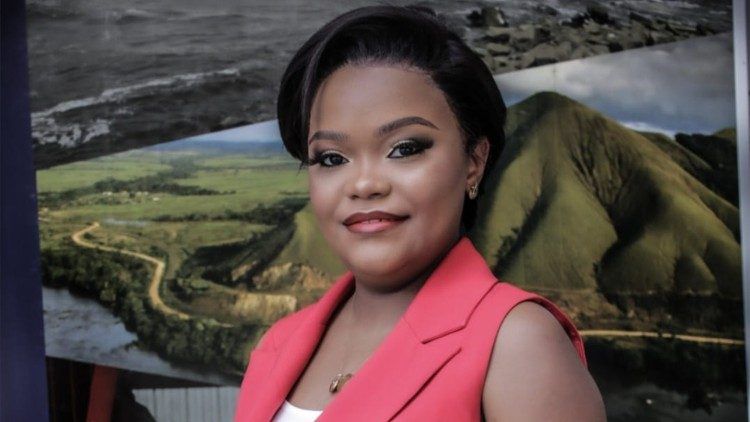
Lysiane Neyer, Gabonese political analyst, National Media Secretary and spokesperson for the “For Change” party, PLC
Yes, we are in a democracy, so they have their words to say and, certainly, they have their arguments to be heard. On the other hand, I am not of the opinion that we should make a king president. In this constitution, there is still the neutralization of powers. The president, although head of the executive, and not referring to a prime minister, still has the executive who asks questions, who monitors budget execution, etc. And no, we are not devoting to a king president. On the other hand, we must welcome the fact that, for the first time, in our Constitution, we have put restrictions in place, whether on the limitation of mandate or the fact of not having a dynastic succession at the head of power, like that was the case in the sub-region, these are firsts which should be welcomed. Indeed, this constitution will be put to the test of its execution, and at that time, if in the execution we realize that there are pitfalls, it can always be modified. And also for the first time, this constitution can only be revised by a referendum. So the power is really given to the people to express themselves. On the other hand, I call on all the free forces of the nation to remain mobilized. If the unions are mobilized, all classes, the pressure groups are mobilized, it will be difficult to have a president-king. The responsibility lies with the people because we are a republic and the power lies with the people to ensure that the state functions properly. And given that the mandate is limited, even if we have a president-king, he will only be king for a well-defined period of time, which was not the case in all the other constitutions which were validated by these same political actors.
Speaking of the pitfalls, what are the limits, the weak points of this constitution, in your opinion?
As weak points that can be noted, there is a subject that is particularly close to my heart, that of public schools. In this constitution, it is not clearly stated that school, responsibility for education falls to the public authorities. It is not clearly mentioned that school is compulsory until age 18 or 16 in the Gabonese Republic. On the other hand, there is an article which is devoted to the financing of private establishments. For me, this is a subject that particularly touches me because education is the basis for building conscious citizens, citizens who can influence the management of the country. Gabon is a small country of two million inhabitants, we will only be able to stand out in the concert of nations through the excellence that we will have in everything we will do. For me, the absence of this principle in the Constitution is something that is close to my heart. This is a fundamental subject, which we have not been able to address in sufficient depth in this draft constitution. But the fact remains that these are articles which can be modified and which may be modified subsequently and which do not constitute a block to voting yes.
Transition, General Brice Oligui Nguema promised to return power to civilians at the end of a two-year transition. Do you think this could be possible if the new fundamental law was passed?
Of course, this constitution enshrines the principles of presidential eligibility and any Gabonese who is deemed eligible according to its criteria will be entitled to compete and at that time it is the sovereign people who will decide who will be the elected president of Gabon. So, for me, starting to accuse x or y of intentions is just political calculations. The eligibility criteria are well defined in the Constitution and any Gabonese who meets these criteria has the possibility of competing and soliciting the votes of citizens. And it is the sovereign people who will decide who will be empowered to lead the destiny of Gabon for the next seven years.
What appeal would you make to your compatriots at the time of this vote?
I appeal to the Gabonese people, to the voters, those who are on the electoral lists, we are called to decide on a turning point in our history. Let's go massively to the polling stations and vote in conscience, whether for yes or no. There will not be one side that will be the winner and one side that will be the loser, no. Only democracy will have triumphed and we owe this momentum and this courage and this love to the Gabonese homeland which saw us born, to which we owe everything. To the Gabonese political class, I will appeal to responsibility. Gabon will not stop after this referendum, no matter which side it wins, may all the active forces of the nation remain mobilized with the credo of patriotism and excellence in everything we do for well-being common, that everyone plays their part knowing that we have only God, our ancestors and the law as our only authority, that everyone is guardian of this constitution in each plot that they will have to manage and that the bad practices which yesterday, more than people or more than political parties wanted to pull us down, that we take this historic moment to overhaul our ways of doing things, our practices, that we put more ethics and more value in the management of a public thing, because Gabon, united and united, needs political actors to take responsibility and above all to demonstrate ethics and morality in the management of public affairs.

